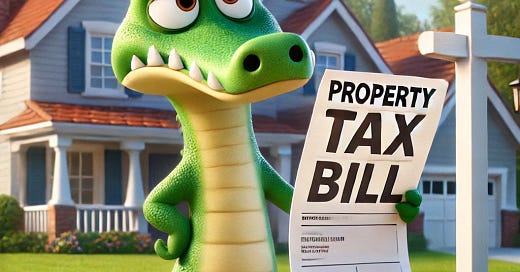There exists, in the American mind, this enduring fantasy—that after decades of work, of paycheck deductions and mortgage payments, of the occasional indulgence in that greatest of all financial indiscretions, the home renovation project, one might finally cross the finish line into that most hallowed state of being: true homeownership. That moment when you can walk into your yard barefoot and feel the grass under your feet on the property that you now fully own—debt free. And yet, lurking beneath this noble aspiration, hidden in the fine print of our social contract, is an inconvenient truth: you never really own your home. You merely rent it from the government, indefinitely, at whatever rate it determines, in perpetuity.
Governor Ron DeSantis, to his credit, has taken the first steps in acknowledging this peculiar form of legalized extortion, identifying property taxes as not merely a necessary evil but an outright oppressive and ineffective means of funding public services. This, of course, is an act of intellectual bravery, since it is a curious and continuous quirk of our modern age that to challenge taxation—once upon a time the spark that ignited revolutions—is now considered the domain of cranks and radicals. Nevertheless, the governor is correct, and the path forward is clear.
The only reasonable conclusion, then, is that property taxes, like an overindulgent houseguest who has worn out his welcome, must go. Not at once, of course. We are conservatives, not Bolsheviks. We believe in reform, not revolution. But go they must, and if Florida is to become the first state to rid itself of this particularly medieval means of revenue extraction, it must do so in a manner both prudent and permanent.
Why Property Taxes Must Die—A Gentle Yet Resolute Euthanasia
It’s an absurdity, upon even the most cursory examination, that the government should be able to seize a man’s home for failing to pay his annual tribute, even if he has no other debts to his name. Back in the day of the feudal lords, they at least had the decency to demand rent before allowing their vassals to construct their hovels upon their land. Today, the arrangement is in some ways more perverse—men are permitted to build and buy freely, so long as they agree to be taxed for eternity thereafter.
Worse yet, this burden falls most cruelly upon the elderly and those on fixed incomes, who find themselves at the mercy of an ever-expanding tax assessor’s ledger—punished not for some failure of industry, nor for any lapse in responsibility, but simply for continuing to exist within the walls they have already paid for. Unlike the young, they cannot simply “work harder” or “earn more.” Their incomes are drawn from annuities, retirement savings—finite resources, not the playthings of high-frequency traders—and, in the worst cases, the meager offerings of Social Security. By 2035, no less than 30% of the Florida population will be over the age of 65—nationally that figure will be about a quarter of our population—yet they will be expected to pay ever-rising property taxes to fund schools their children no longer attend and amenities they are too old to enjoy. This is, in every meaningful sense, a form of theft—one that would, in any other context, summon law enforcement. It’s a crime of property, certainly, but also one of morals, inflicted upon those least able to resist it.
If there exists a justification for this arrangement that can withstand moral, economic, or even aesthetic scrutiny, I have yet to encounter it.
Fortunately, there exists a solution—one that doesn’t involve fiscal irresponsibility, nor the impoverishment of our schoolchildren, nor the apocalyptic collapse of police and fire services that the more excitable members of the public sector—and Democrat opposition—would surely predict.
A Conservative Path to Liberty
Now with this we shouldn’t be reckless. Florida, after all, is a conservative





